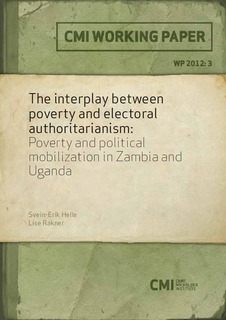The interplay between poverty and electoral authoritarianism: Poverty and political mobilization in Zambia and Uganda
Working paper
Permanent lenke
http://hdl.handle.net/11250/2474909Utgivelsesdato
2012-02-28Metadata
Vis full innførselSamlinger
- Publications [1488]
Originalversjon
Bergen: Chr. Michelsen Institute (CMI Working Paper WP 2012:3) 22 p.Sammendrag
In this paper we wish to analyze the interplay between the political setting of electoral authoritarianism and economic grievances expressed in particular by an urban poor electorate in Africa. We show that the outcomes of this interplay have varied considerably across the region. While opposition politicians in some countries such as Zambia (2011) have been able to channel the political discontent into electoral victories and subsequent electoral turnover, most electoral authoritarian regimes in Sub-Saharan Africa have managed to stay in power. Uganda is an example of this. The analysis of recent political developments in these two countries will highlight two interrelated questions: What may explain the variance found? And, are some forms of poverty more challenging for the survival of electoral authoritarian regimes than others?
